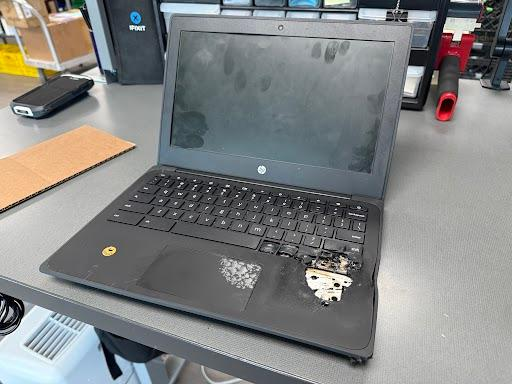
Courtesy Boulder Valley School District

Audio By Carbonatix
Do you recall the “I’m a Mac”/”I’m a PC” Apple commercials that aired from 2006 to 2009? If they were updated to today’s options, they would need a limbless meat puppet zombie to pipe up, “I’m a Chromebook!”
Perhaps my disdain for the cheap, Google-powered web access machines is hyperbolic, but my heart sank a bit when I was assigned a plastic Acer Chromebook as I onboarded into my new role as staff writer at Westword. My MacBook Pro is a Maserati compared to the Chromebook, which is more like a Yugo.
The next day, Boulder Valley School District sent an email to families and staff members warning of a new viral TikTok trend with school-issued Chromebooks, and a handful of news articles repeated the message that the Chromebook Challenge was dangerous.
“Recently, the Boulder Valley School District has experienced six fires that appear to be related to a new viral social media trend,” the letter began. “It appears that students were encouraged by videos on social media to short-circuit their laptop or puncture the device’s lithium batteries. This causes the battery’s temperature to rise rapidly and uncontrollably, which can lead to a fire or explosion and release toxic fumes.”
I was intrigued. Not just by the ingenuity of today’s troubled youth, but by the images in my head of my plastic Acer Chromebook in flames.
I picked up the phone and called Randy Barber, chief communications officer for the Boulder district, to ask about the students’ destructive acts, of course, but also perhaps to find out what not to stick in a Chromebook port if you don’t want it to burn.
(To be clear, I’d be thrilled to see this Chromebook incinerate itself.)
I asked Barber if there wasn’t some Streisand Effect happening, since his warning had certainly made me more interested in doing the Chromebook Challenge. He laughed. “It’s been out there, they’re saying it through the channels they use,” he said, referring to the students’ social media.
The following day, Denver Public Schools sent a similar letter to parents and guardians, warning that “participating in this behavior will result in disciplinary consequences and could potentially lead to legal repercussions for students.” I wondered if I, too, might face disciplinary consequences and potential legal repercussions if I took the challenge. (I had skipped the property destruction chapter in the employee handbook.)
I rang up DPS external communications director Scott Pribble, who said the district had collected reports of over thirty incidents as of May 8.
Pribble also discounted the Streisand Effect of the media coverage. “No, that is more TikTok and word of mouth. Most students are not watching news reports,” he said. Damn kids.
Pribble didn’t tell me what specific instruments the kids were using to try to short-circuit the machine and make the battery incinerate, saying he doesn’t know for a fact and wouldn’t want to be wrong.
Barber, the BVSD spokesman, had a little more constructive destructive information for me. “The [TikTok] video that I’ve seen and what I’ve heard largely is paper clips,” he said. “They’re shorting out the computer through the USB port and using a paper clip or thumbtack to do it.”
I made a visit to the office supply closet at Westword. Paper clips, check. Thumbtacks, check.
And then for the safety of the children – not the students in the districts, but my children, who need to be fed and clothed and sheltered near-daily and demand weekly allowances – I decided that I should ask permission from my editor to destroy the Chromebook in the parking lot in the name of journalism.
It wasn’t an instant “No,” but her hunt for a Chromebook heading for the glue factory (as if there were any other kind) came up empty.
Alas, no dud to immolate. And I’m not ready to leave this operation just yet, so the paper clips and thumbtacks sit temptingly on my desk as I type this on my own Mac, the Chromebook glaring at me with Gmail on its face.
I’ll have to talk to my kids about not setting laptops on fire at school before I fall asleep and dream of Chromebooks in flames tonight.